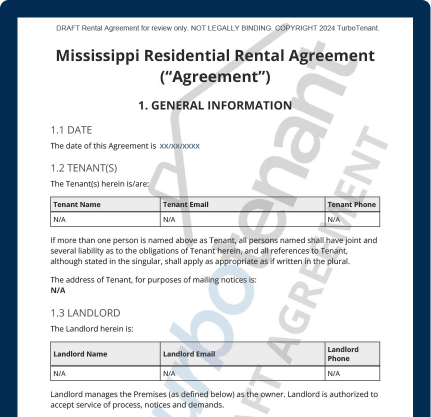Mississippi landlord-tenant law is a set of guidelines established by the state legislature that help define the landlord-tenant relationship, protect landlords’ investments, and ensure Mississippi tenant rights are properly considered.
In this article, we’ll review the rights and responsibilities of landlords and tenants, how landlords must handle security deposits, the importance of lease agreements, and the eviction process in Mississippi.
While there might not be a lot of new Mississippi landlord-tenant law updates to discuss, there’s real value in gaining a comprehensive understanding of what’s out there. So read on to discover everything you ever wanted to know about Mississippi landlord-tenant law.
Key Findings: Landlord-Tenant Rights & Responsibilities
One of the most critical aspects of landlord-tenant law is understanding the rights and responsibilities of both landlords and tenants when renting property. Apart from the lease agreement, which explicitly defines the relationship, these rights and responsibilities are important elements for everyone to understand.
Mississippi landlords have the right to:
- Collect rent. Landlords are entitled to receive on-time rent payments as described in the lease agreement.
- Charge late fees for late rent. While Mississippi doesn’t cap the amount of late fees that landlords can charge, that information should be in the lease.
- Enter the property. Landlords have the right to enter the rental unit as long as they provide property notice ahead of time.
- Evict tenants for lease violations. Landlords can evict a tenant for violating the lease per Mississippi law.
- Collect a security deposit. Security deposits safeguard a landlord’s investment and can be collected during lease signing.
Mississippi landlords are responsible for:
- Setting the terms of a lease. Leases are critical when renting property, and the landlord can dictate the terms.
- Providing a habitable unit. Rentals must meet a minimum standard for habitability at all times.
- Making necessary repairs. When a unit needs it, landlords must make a reasonable effort to make necessary repairs.
- Complying with local and federal laws. Landlords must obey the law at all stages of the rental engagement.
- Returning the security deposit. While landlords may withhold funds from the security deposit for certain things, landlords must return the remainder within 45 days.
Mississippi tenants have the right to:
- Safe and sanitary housing. Tenants are entitled to live in a property free of danger or unsanitary conditions.
- Privacy. Landlords must provide proper notice before entering the tenant’s unit.
- WIthhold rent for unmade repairs. Tenants may repair and deduct from a future rent payment when the landlord doesn’t make a needed repair in a reasonable timeframe.
- Rent free of discrimination. Under federal law, landlords may not discriminate against tenants based on several protected characteristics.
- Terminate a lease for valid reasons. There are a few instances where a tenant may end a fixed-term lease early and without penalty. More details on that are below.
Mississippi tenants are responsible for:
- Paying rent on time. Tenants must follow the lease when making rent payments.
- Complying with lease terms. Tenants must obey the lease terms to avoid potential conflict with the landlord or the threat of eviction.
- Provide proper notice before moving out. Month-to-month tenants must give at least 30 days’ written notice before ending their lease.
- Notifying the landlord of repair issues. Tenants must communicate effectively with the landlord when vital systems in the unit fail.
- Maintain the property. Tenants should maintain the rental unit in good condition and free of trash or unsanitary conditions.
Best Practices for Screening Prospective Tenants
Mississippi landlords are free to charge a rental application fee of any amount and use the application to determine the best renter for their property. Landlords are also legally allowed to review the tenant’s criminal and credit history and factor that into the decision-making process, as long as they do so without discrimination based on the tenant’s background.
Landlords must always establish and apply consistent criteria to judge all applicants, per fair housing laws. It is also a good idea to store all documentation after the screening process in case that information is needed later.
TurboTenant provides comprehensive tenant screening features for free to landlords, with the cost passed on to the applicant. It’s a great tool for landlords because it enables them to apply the same criteria to all applicants.
Compliance with Fair Housing Laws in Mississippi
Federal fair housing laws aim to keep the housing process as free from discrimination as possible. By establishing protected classes, these laws ensure that renting property is an equal playing field.
What actions are considered housing discrimination?
The Federal Fair Housing Act describes a few characteristics landlords are prohibited from considering as a part of the screening process. These include:
- Race
- Color
- National origin
- Religion
- Sex (including gender identity and sexual orientation)
- Familial status
- Disability
If a landlord refuses to rent to someone because of one of the above criteria or charges more for rent just because the tenant belongs to a protected class, that would be considered discrimination.
Further, landlords must advertise units and screen tenants exactly the same way across the board to avoid any potential accusations of discriminatory practices.
How can discrimination be avoided in rental practices?
Avoiding discrimination in rental practices is as easy as treating every applicant exactly the same, regardless of the characteristics described above. Each applicant should face the same criteria and decision process, no matter where they come from or who they are.
As an extension of the landlord, any staff involved with making application decisions would be trained and well-versed in discrimination law while also making reasonable accommodations for those with disabilities.
What are the repercussions for fair housing violations?
Depending on the violation, landlords who discriminate against potential tenants could face lawsuits or fines from local, state, or federal government agencies. Penalties could include civil, compensatory, or punitive damages and even damage the landlord’s reputation in the community.
If landlords are accused of discrimination, they should take the accusations seriously, gather all relevant evidence, and discuss their options with a legal professional, if necessary.
Mississippi Lease Agreements
Mississippi landlord-tenant law allows a lease to be either oral or written, though we recommend written leases. However, the law requires a written lease for tenancies lasting a year or more.
A lease agreement is a legally binding contract that guides any rental engagement. It prevents misunderstandings between the landlord and tenant, outlines each party’s expectations, and dictates the terms under which the tenant can live on the property.
There are generally two types of lease agreements:
- Month-to-month: A month-to-month lease can be a flexible option for landlords and tenants and can be canceled at any time as long as 30 days’ written notice is provided.
- Fixed-term: A fixed-term lease has a predefined rental period, and the contract ends on the last day of the term. However, these contracts can only be terminated if an early termination clause is included or the tenant meets a legally qualifying condition.
Which lease terms are legally required in Mississippi?
Since a lease is a legal document, certain things are required for it to be considered valid. Leases in Mississippi should include:
- The names and addresses of all parties
- A physical description of the property
- The lease duration
- The rent amount, payment methods accepted, due date, and any associated late fees or grace period
- The terms of the security deposit
What constitutes legal renting in Mississippi?
Mississippi rental units must meet a minimum level of habitability, including considerations for health and safety codes, building codes, and occupancy limits, to be considered legal rentals.
Landlords must comply with all building codes and safety ordinances, as these protect the tenant and the property. For rental units to be habitable, they must have working plumbing, heating, and electrical systems, as well as trash removal.
What tenant documentation is required?
When a tenant applies for a rental, landlords will typically ask them to provide:
- A valid ID (government-issued like a driver’s license, passport, or military ID)
- Proof of employment/income
- Rental history, if requested
- Credit history*
- Criminal background history*
Landlords should keep copies of all relevant material during the application process in case they are needed later.
*These are usually provided by the screening service used by the landlord
What are the mandatory landlord disclosures in Mississippi?
Federal and state laws require the property owner to provide certain disclosures about the rental unit to the tenant when the lease is signed. Mississippi state law does not mandate any disclosures; however, federal law requires all landlords to inform tenants of any lead-based paint or lead-based paint hazards for units built before 1978.
Security Deposits in Mississippi
Landlords use security deposits to add a layer of financial protection to their property investments. Depending on the situation, the landlord can safeguard against unpaid rent, damage to the rental unit, or other lease violations by collecting a security deposit.
What are the guidelines for security deposit collection?
Mississippi landlord-tenant law does not limit the amount a landlord can charge for the security deposit or require the landlord to tell the tenant where the funds are held.
While not required, some landlords require the tenant to complete a move-in checklist on the day of lease signing. The checklist establishes a baseline for the physical condition of the property and can be compared to the condition of the unit when the tenant moves out.
When can deductions be made from security deposits?
Mississippi landlords are allowed to withhold funds from the security deposit for unpaid rent, cleaning, or repair damage beyond normal wear and tear. Landlords should carefully track every deduction to maintain full transparency throughout the process.
How should security deposits be returned?
Once landlords withhold funds from the security deposit, they should provide the tenant with an itemized list of those deductions. The landlord can deliver the itemized list to the tenant when they return the remainder of the security deposit, which must be within 45 days of move-out.
Maintenance Responsibilities of Landlords
Mississippi tenant rights require landlords to keep up with maintenance needs for their rental units. To be considered a legal rental in good standing, the unit must always meet minimum habitability standards, and when it does not, landlords must make an effort to bring it back up to code.
What are the legal standards for property conditions?
To meet the minimum habitability standards, the following should be in good working condition:
- Plumbing, including running water
- Heating systems
- Electrical systems
- Structural integrity
- Smoke and carbon monoxide detectors
What is the proper protocol for repairs?
Tenants in Mississippi must provide landlords with written notice of a defect that must be corrected if it is considered a lease breach. If the landlord has not made the required repair within 30 days, the tenant may repair the issue and either deduct the cost from a future rent payment or demand reimbursement within 45 days. The amount withheld cannot exceed one month’s rent, and the tenant must be current on all rent payments.
Do landlords need to give tenants advance notice before accessing a rental property?
No Mississippi law regulates the notice a landlord must give the tenant before entering the unit. However, the notice should be reasonable.
Landlords who repeatedly enter a unit without permission could be committing landlord harassment. Tenants who feel that their landlord is harassing them can petition the court to prevent access or potentially cancel the lease agreement.
Late Rent Fee Regulations
Mississippi landlord-tenant law does not require landlords to provide a grace period to pay rent. If the rent is late, landlords are free to charge however much they see fit for late fees. However, the lease agreement should include that information.
Rent Control in Mississippi
Rent control is the process by which a government limits how much a landlord can increase the rent on an existing tenant. Mississippi has no rent control laws, so landlords can increase the rent as they see fit as long as they provide proper notice.
For month-to-month leases, landlords must provide tenants with at least 30 days’ written notice before the increase takes effect.
Tenants with fixed-term leases can see their rent increase immediately following the expiration of the lease term, and landlords are not required to give advance notice of such an increase.
Lease Renewal and Termination
Terminating a lease is handled differently depending on the kind of lease and the circumstances surrounding the termination. Landlords or tenants can terminate month-to-month leases as long as they provide 30 days’ written notice. However, terminating a fixed-term lease at any point before the term ends requires a legally valid reason for the tenant to avoid penalties.
Mississippi tenant rights do allow for a tenant to legally terminate a lease early and without penalty if they meet one of the following conditions:
- Military service
- Domestic Violence
- Uninhabitable living conditions
- Voidable lease
- Early termination clause
- Landlord harassment
Tenants who break a fixed-term lease early and do not meet a qualifying condition could be liable for the remainder of rent on the term, late fees, or other damages.
Landlords can end a fixed-term lease in the following circumstances:
- Violation of lease terms by the tenant
- Taking back use of the property for themselves or their family
Eviction Procedures for Mississippi Landlords
Landlords should fully understand Mississippi landlord-tenant law before deciding to pursue an eviction proceeding against a tenant, as eviction procedures can vary from state to state.
What justifications exist for eviction?
Mississippi is a just cause (fault) eviction state, which means landlords must have a valid reason for pursuing an eviction against a tenant. Valid reasons include:
- Non-payment of rent
- Lease violations
- Illegal activity
Landlords must document every step of the process, as the evidence for the eviction will likely need to be presented in court.
What is the eviction process?
The eviction process in Mississippi goes like this:
- Deliver a notice to vacate
- For non-payment of rent, 3-day notice to pay or quit
- For lease violation, 30-day notice to cure or quit
- File an eviction lawsuit
- Attend the court hearing
- Obtain a writ of possession
- Evict the tenant
How is property reclaimed after eviction?
Once the court issues a writ of possession, local law enforcement may have to remove the tenant. Landlords should then change the locks to ensure the property is secure and the previous tenant cannot return.
Mississippi does not have specific laws regulating what a landlord must do with a tenant’s property if left behind.
Local Ordinances for Landlords and Tenants
As we’ve discussed, Mississippi landlord-tenant laws are fundamental for Mississippi landlords to understand fully. But, local ordinances can play a big part in how renting property works at a local level.
Municode is a great resource for landlords who want to stay fully informed about local landlord requirements and Mississippi tenant rights.
Federal Landlord-Tenant Laws
While this article mainly focuses on Mississippi-specific landlord-tenant guidelines, the federal government plays a part in renting out property.
- Fair Housing Act: This law prohibits discrimination based on protected classes, including race, color, religion, sex, national origin, familial status, and disability.
- Americans with Disabilities Act (ADA): Requires landlords to provide reasonable accommodations and accessibility for people with disabilities.
- Consumer Financial Protection Bureau (CFPB): The CFPB protects consumer rights in a number of areas, including housing protections.
Managing Tenant Legal Disputes as a Mississippi Landlord
Sometimes, conflict is unavoidable over the course of a landlord-tenant relationship. If, as a landlord, you find yourself mired in a dispute, it’s best to communicate clearly and openly with your tenant, documenting everything along the way. And while the lease agreement is the standard by which the relationship should operate, sometimes additional resources are needed to solve the challenge properly.
- Mississippi Justice Court handles small claims and eviction cases, providing resources for landlords and tenants.
- The Mississippi Center for Justice is a nonprofit that offers legal support and educational resources for landlords and tenants.
- The Mississippi Bar Association provides a Mississippi tenant rights hotline that can provide tenants with important information about the housing process.
Navigate Your Landlord-Tenant Relationship with TurboTenant
We know that life as a landlord can be a lot of work, and navigating Mississippi landlord-tenant law and Mississippi tenant rights at the same time can be challenging. That’s why TurboTenant is here to help. TurboTenant is free property management software that streamlines your day-to-day workflow, organizes your business, and lets you scale at the rate you want to.
TurboTenant offers landlords a number of high-quality features, such as:
- Online rent collection
- Repair and maintenance tracking
- Tenant screening
- Robust accounting tools
… and a lot more. So sign up for a free TurboTenant account and let us help you take your landlord-tenant relationships to the next level.
Mississippi Landlord-Tenant Law FAQs
What are landlords required to provide by law?
Landlords must provide a habitable unit with running water, working plumbing, heat and electricity, and trash removal.
While not required, some landlords also offer tenants amenities such as laundry services, common areas, and parking.
What is the proper notice period for lease termination?
While a fixed-term lease does not require advance notice before it ends, landlords and tenants can end a month-to-month lease by providing the other party with at least 30 days’ written notice.
How should utilities be handled in rental agreements?
The lease agreement should clearly assign utilities to either the landlord or the tenant. This can help avoid miscommunication and confusion and ensure that utilities continue uninterrupted.
What maintenance rights do tenants have?
Mississippi landlords must address necessary repair and maintenance issues within 30 days, depending on the severity of the problem. If the repairs are not made, the tenant may be able to handle them themselves and either deduct the amount from a future rent payment or receive reimbursement from the landlord.
What are the eviction rules for tenants without a lease?
Regarding evictions and Mississippi tenant rights, no lease doesn’t change much about the process. Landlords must still provide the proper notice to the tenant that outlines the reason for the eviction process and then follow the standard procedure from there.
How are guests and tenants legally differentiated?
The most significant difference between a guest and a tenant is how long the person intends to stay on the property. A tenant typically has a lease agreement with the landlord and intends to stay on the property for a longer period. A guest, meanwhile, is someone without a lease agreement who intends to stay on a property for a short period.
The landlord must proceed through an eviction process to remove a tenant. However, removing a guest who is considered trespassing can be done immediately by calling local law enforcement.






